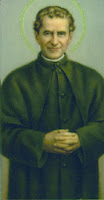Today we continue our monthly series here at The Thin Veil called “Learning from the Saints”. Our guide is saint-expert Bert Ghezzi, a dear friend of mine and the author of numerous books including Voices of the Saints, Saints at Heart, and Adventures In Daily Prayer. His newest book is Discover Christ: Developing a Personal Relationship with Jesus. You can learn more about Bert and his work at www.BertGhezzi.com.
Today, Bert shares the story of St. John Bosco, a great example of priestly fatherhood for a Church still reeling from the sex abuse crisis. Read below to learn more.
God must have laughed heartily at the joke he played when he gave St. John Bosco (1815-1888) to the nineteenth century. Don John Bosco was a man of great faith in an age of great unbelief. He was a wonder worker who routinely performed miracles, was guided by dreams, read people’s consciences and accurately predicted the future.
 However, Don Bosco was mainly an evangelist, educator, and leader of men. He used all of his gifts, both spiritual and natural, for others. For nearly half a century, he evangelized, catechized and cared for homeless youths in Turin, Italy. And he founded a religious order that has extended his ministry throughout the contemporary world.
However, Don Bosco was mainly an evangelist, educator, and leader of men. He used all of his gifts, both spiritual and natural, for others. For nearly half a century, he evangelized, catechized and cared for homeless youths in Turin, Italy. And he founded a religious order that has extended his ministry throughout the contemporary world.
In 1841, a newly ordained priest, he came to Turin to study theology. From there he launched his mission. Hundreds of street youths began to gather around him. First they flocked to his Sunday events for fun, games, food, catechism, and worship. Over the next 15 years he collected abandoned youths in a rag tag, but impressive community. With nothing but faith, he built them residences, workshops, schools and churches.
But the most valuable thing Don Bosco gave his boys was love. Most of the children soaked up his affection and responded by getting their lives on track. In a letter to a colleague, the saint explained the role of charity in his educational method:
“It is better to punish our own impatience and pride than to correct the boys. We must be firm but kind and patient with them. Take as a model the charity of Paul which he showed to his new converts. They often reduced him to tears and entreaties when he found them lacking docility and even opposing his loving efforts.
“See that no one finds you motivated by impetuosity or willfulness. It is difficult to keep calm when administering punishment, but we must do so if we are to keep ourselves from spilling out our anger.
“Let us regard the boys as our own sons. Let us not rule over them except for the purpose of serving them better. This was the method Jesus used with the apostles. He put up with their ignorance and roughness and even their infidelity. He treated sinners with a kindness and affection that caused some to be shocked, others to be scandalized, and still others to hope for God’s mercy. And so he bade us to be ‘gentle and humble of heart.’
“They are our sons, and so in correcting their mistakes we must lay aside all anger and restrain it so firmly that it is extinguished entirely.
“There must be no hostility in our minds, no contempt in our eyes, no insult on our lips. We must use mercy for the present and have hope for the future, as is fitting for true fathers who are eager for real correction and improvement.”
A small band of priests joined Don Bosco and in 1854, at a time when Italian anti-clericals were banning religious orders, he successfully organized them into a community. He named them “Salesians” after St. Francis de Sales, his favorite saint.
In 1883 Don Bosco had an incredible vision of his brothers traveling to the ends of the earth via automobiles, freeways and airplanes! As a fitting testament to his holiness, that dream has now come true, as today there are about 2,000 Salesian communities in 113 countries.
(Image credit: Catholic.org)
Read more from Bert at his website, www.BertGhezzi.com, or check out his many books on Amazon.
 |
 |
 |

